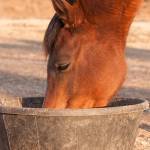Prebiotic Powers of Sugar Beet Pulp Explored in Horses

Sugar beet pulp, a palatable, high-fiber feed for horses, purportedly has prebiotic effects. Confirming this assertion, one research team found that partial replacement of timothy hay with sugar beet pulp favors the expansion of bacteria within the fecal microbiome, thereby fostering intestinal health.*
The intestinal microbiome includes a community of beneficial microorganisms, primarily bacteria. Keeping bacterial populations balanced helps maintain a horse’s overall health. Shifts in the intestinal microbiome (i.e., overgrowth of certain types of bacteria) in response to diet changes and stress are believed to contribute to gastrointestinal disturbances such as colic and colitis.
“Prebiotics, probiotics, and postbiotics are believed to play a role in modulating and stabilizing the microbiome and providing health benefits through strengthened immunity. However, their use requires further evaluation as factors such as microbe strain, manufacturing stability, duration of supplementation, and safety should be considered,” explained Catherine Whitehouse, M.S., a nutrition advisor for Kentucky Equine Research.
Prebiotics feed and stabilize the existing, healthy bacterial populations in the hindgut. In contrast, probiotics deliver live microorganisms such as yeast and bacteria to the hindgut. Researchers from the University of Missouri recently investigated the prebiotic effect of sugar beet pulp as a way of regulating the microbiome.*
Sugar beet pulp is composed of readily digestible fibers, pectin, and various sugars, such as mannose, glucose, galactose, and arabinose, that the bacteria in the hindgut use to produce short-chain fatty acids (SCFAs).
“One of these SCFAs, butyrate, is particularly important because it exerts anti-inflammatory effects and serves as an energy source for colonocytes, the absorptive cells that make up the lining of the large intestine. Energized colonocytes maintain tight junctions between adjacent cells. These tight junctions prevent bacteria and toxins from passing from the inside of the intestinal tract to the horse’s circulatory system,” said Whitehouse.
To determine if sugar beet pulp could help stabilize the microbiome in the face of a diet change, 12 horses were recruited for a study. Researchers investigated how a change from pasture to a hay-only diet affected the fecal microbiome and if feeding sugar beet pulp could mitigate those changes. Five days after removing horses from pasture and offering timothy grass hay, sugar beet pulp (2.5 lb or 1 kg twice daily for seven days) was added to six horses’ diets, replacing a portion of timothy grass hay. The remaining six horses were fed only timothy grass hay and used for comparison.
Fecal samples were collected from each horse daily during the 12-day study. Standard techniques for assessing the microbiome (e.g., 16S rRNA amplicon sequencing) were employed to compare the microbiomes of horses that did and did not receive sugar beet pulp following an abrupt diet change.
No specific changes in the bacteria that altered richness or diversity were detected in horses fed sugar beet pulp, but an increased abundance of Bacillota bacteria, which are considered butyrate producers, was observed.
The research team concluded, “The consistent increase in butyrate producers in the fecal samples of horses receiving sugar beet pulp suggests that the partial replacement of grass hay with sugar beet pulp increases SCFA production capacity, in theory promoting overall gut wellness.”
They went on to suggest that these results may be used to “improve management practices, reduce the incidence of large intestinal dysbiosis, and decrease emergency health issues in horses.”
“Beet pulp is a highly regarded feedstuff for horses often referred to as a ‘super fiber.’ Other super fibers include soybean hulls, lupin hulls, and almond hulls. These ingredients have become staples in modern-day horse feeds to provide a balance of energy sources and support digestive health,” said Whitehouse.
Stabilizing the hindgut may also be achieved by offering EquiShure. This research-proven supplement uses time-released technology to deliver a buffer to the hindgut to maintain appropriate pH and stabilize the microbiome.
*Ford, T., Z.L. McAdams, K.S. Townsend, L.M. Martin, P.J. Johnson, and A.C. Ericsson. 2023. Effect of sugar beet pulp on the composition and predicted function of equine fecal microbiota. Biology (Basel) 12(9):1254.








